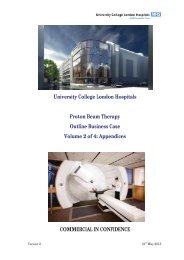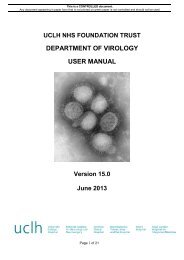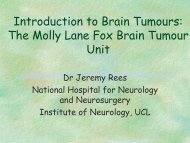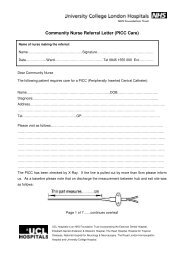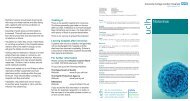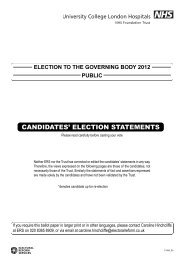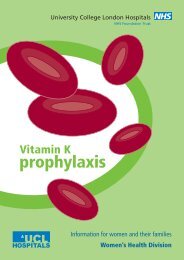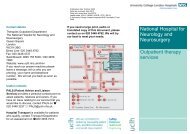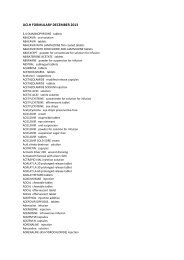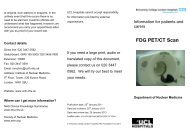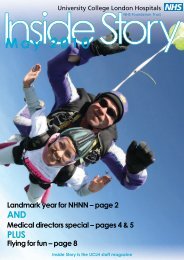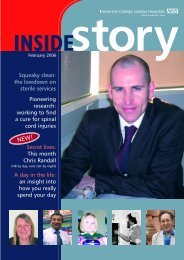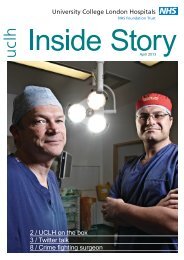How patients have helped us with our research - University College ...
How patients have helped us with our research - University College ...
How patients have helped us with our research - University College ...
You also want an ePaper? Increase the reach of your titles
YUMPU automatically turns print PDFs into web optimized ePapers that Google loves.
12 10 UCLH BIOMEDICAL RESEARCH UNIT<br />
Website helps brain injured <strong>patients</strong> read<br />
Patients <strong>have</strong> been helping<br />
UCL <strong>research</strong>ers develop<br />
an innovative website for<br />
people whose vision has been<br />
damaged by brain injury.<br />
Researchers wanted to find<br />
out the best way of helping<br />
people <strong>with</strong> a condition called<br />
hemianopic alexia (HA) to<br />
rebuild their reading skills.<br />
HA, which can be ca<strong>us</strong>ed by a<br />
stroke, brain tum<strong>our</strong> or severe<br />
head injury, robs a person of<br />
half of their field of vision on<br />
the left or right side, sometimes<br />
slowing their ability to process<br />
written information by more<br />
than 50%.<br />
The challenge was to<br />
create an easy to <strong>us</strong>e<br />
website<br />
There is a therapy which<br />
has been shown to improve<br />
<strong>patients</strong>’ eye movements and<br />
help them rebuild their reading<br />
skills, although it cannot restore<br />
their lost vision. The treatment,<br />
which until recently was not<br />
readily available to <strong>patients</strong>,<br />
involves reading moving or<br />
scrolling text.<br />
The challenge for <strong>research</strong>ers<br />
was to create a website that<br />
people could <strong>us</strong>e to practise<br />
reading moving text and that<br />
they would find convenient<br />
and easy to <strong>us</strong>e. So <strong>research</strong>ers<br />
enlisted <strong>patients</strong> to help them<br />
<strong>with</strong> the Read-Right project.<br />
Dr Alex Leff, a consultant<br />
neurologist at UCLH’s National<br />
Hospital for Neurology and<br />
Neurosurgery, is leading the<br />
project. He is <strong>research</strong>ing into<br />
how language disorders can be<br />
improved by different types of<br />
therapy, <strong>us</strong>ing brain imaging to<br />
track the effects of therapy on<br />
the brain.<br />
One patient Dr Leff worked<br />
<strong>with</strong> is Mark Jarvis who had<br />
a stroke five years ago at the<br />
age of 42.<br />
“I lost my right field of vision<br />
and couldn’t read at all – not<br />
even my own name,” explains<br />
Mark. “That function in my<br />
brain had shut down beca<strong>us</strong>e<br />
there had been so much<br />
damage and swelling.”<br />
Although he made a rapid<br />
Patient Mark Jarvis <strong>helped</strong> develop the Read-Right site<br />
© UCL Medical Ill<strong>us</strong>tration



